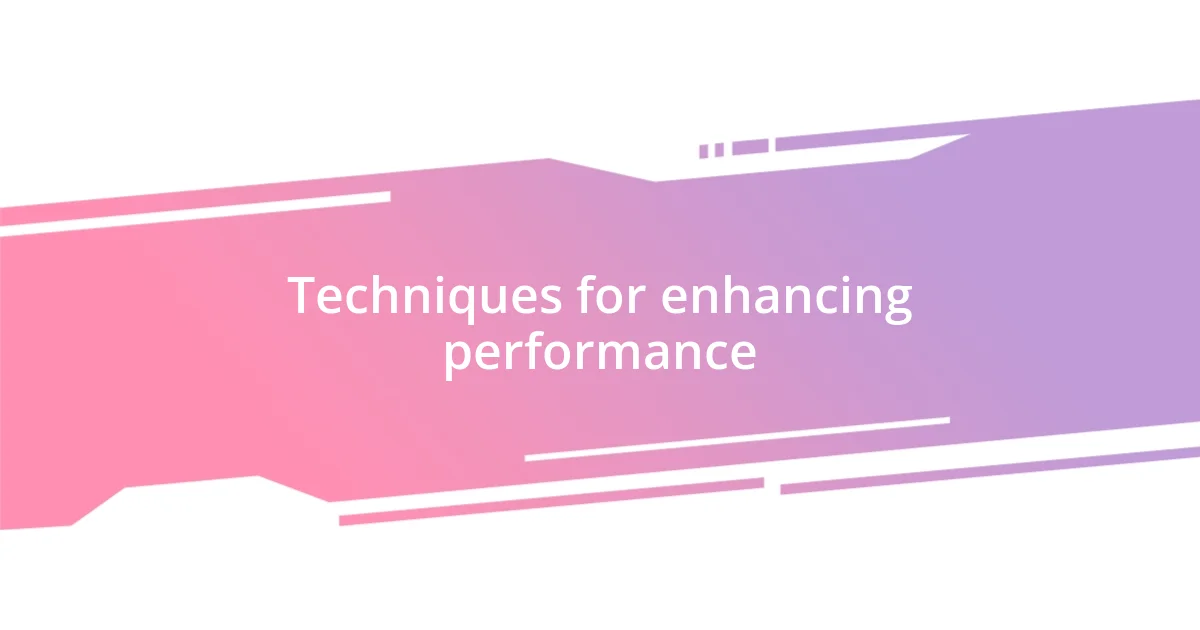Key takeaways:
- Sports psychology enhances athletes’ performance by improving mental resilience, managing anxiety, and fostering effective teamwork.
- Key techniques such as visualization, mindfulness meditation, and goal setting help athletes achieve mental toughness and convert stress into positive energy.
- Successful athletes like Michael Phelps, Serena Williams, and Kobe Bryant exemplify the power of mental preparation and resilience in overcoming challenges and achieving greatness.

Understanding sports psychology benefits
Sports psychology offers a plethora of benefits that can transform an athlete’s performance and mindset. I remember a time when I faced intense competition; the pressure was suffocating. It was through sports psychology techniques that I learned to channel that anxiety into focus, which ultimately gave me an edge against my competitors. Have you ever felt overwhelmed during a critical moment in your sport?
One of the most striking benefits I found is the improvement in mental resilience. Engaging with a sports psychologist helped me navigate through a slump after a disappointing season. I discovered that by reframing negative thoughts and visualizing success, I could regain my confidence. Isn’t it fascinating how our mindset can shape our physical capabilities?
Furthermore, the enhancement of team dynamics cannot be overlooked. I’ll never forget collaborating with teammates through group sessions that improved our communication and trust. The bonds we formed off the field translated into stronger performances during competition. When you think about effective teamwork, doesn’t it make you curious about the mental strategies that could elevate those connections even further?

Key areas of sports psychology
Sports psychology encompasses several key areas that significantly impact athletes. One of the most essential is mental toughness, which I’ve found crucial in pushing through challenging training sessions. In my early days of competing, I often faltered under pressure, but learning coping strategies, like positive self-talk, helped me overcome barriers and stay focused.
Another vital area is the management of performance anxiety. I remember standing on the starting line feeling my heart race; it felt like I was about to burst. Through techniques such as deep breathing and visualization, I learned to calm myself, transforming anxiety into excitement. These tools not only prepared me mentally but also improved my physical performance, showing me how intertwined our thoughts and actions truly are.
Lastly, goal setting is a pivotal aspect of sports psychology. During my journey, I set specific, measurable goals that kept me motivated and on track. With the guidance of a sports psychologist, I discovered how breaking down big dreams into smaller, achievable milestones could create a clear pathway to success. It’s remarkable how shifting my focus from just the outcome to the process itself made the journey so much more rewarding.
| Key Areas of Sports Psychology | Description |
|---|---|
| Mental Toughness | Building resilience and the ability to stay focused under pressure. |
| Performance Anxiety Management | Techniques to transform anxiety into excitement for peak performance. |
| Goal Setting | Establishing clear, actionable objectives to stay motivated and focused. |

Techniques for enhancing performance
Focusing on performance enhancement, I’ve personally found that mental imagery can be a game changer. Before a big event, I would close my eyes and visualize my ideal performance. I can still feel the surge of motivation that came with picturing myself succeeding—it ignited a fire within me. This technique not only calmed my nerves but allowed me to mentally rehearse my actions, making my physical execution feel more natural and confident.
To further enhance performance, consider these techniques:
- Progressive Muscle Relaxation: This involves tensing and then relaxing different muscle groups, which can reduce tension and improve focus before competition.
- Mindfulness Meditation: Practicing mindfulness helps maintain present-moment awareness, allowing athletes to fully engage in their performance without being distracted by past failures or future worries.
- Affirmations: I often recited positive statements to boost my self-belief and counter negative thoughts. This simple practice reinforced a winning mindset and set the stage for better performance.
Implementing these strategies not only helped me achieve my personal best but also enriched my overall experience in sports.

Building mental resilience in athletes
Building mental resilience is vital for athletes navigating the highs and lows of competition. I recall an instance before an important match when self-doubt crept in like an unwanted guest. Instead of succumbing, I focused on the hard work I’d invested. This reminded me that resilience isn’t merely about enduring; it’s about recognizing our efforts and living in that moment of commitment.
Repeatedly, I’ve seen how reframing challenges into opportunities can build resilience. For example, during a particularly tough season, I learned to embrace losses as lessons rather than failures. This mind shift not only eased the weight of disappointment but also instilled a deeper sense of determination. How much could a simple perspective change for you? I found that by focusing on what I could improve, I transformed setbacks into stepping stones toward growth.
Additionally, practicing self-compassion became a game changer. There were times when my performance didn’t match my expectations, and I’d feel down. However, learning to embrace those moments with kindness—recognizing that everyone has off days—made a world of difference. It’s crucial to remind ourselves that resilience is nurtured in the soil of self-acceptance; after all, acknowledging our vulnerabilities is often the first step toward fortifying our mental strength.

Applying visualization strategies
Applying visualization strategies has shaped my approach to sports in profound ways. I remember a time when I was preparing for a critical competition; instead of fretting over all the things that could go wrong, I took a moment to visualize every aspect of my performance, from the moment I stepped onto the field to the final whistle. In those mental images, I could see myself moving fluidly, executing each play perfectly. Isn’t it amazing how our minds can help us feel the thrill of success before it even happens?
One aspect of visualization that I found particularly beneficial was the practice of imagining not just success but the steps I would take to achieve it. I would picture myself overcoming obstacles, like slipping past a defender or nailing a tough shot, which instilled a sense of preparedness. These daydreams became rehearsal sessions, and I could feel the confidence building in me as if I was living it for real. What would happen if you took a few moments each day to visualize your goals so vividly?
Additionally, I learned to anchor my visualization to my emotions. I would take a deep breath and remember the waves of excitement and satisfaction I felt after a successful game. Those sensations helped ground my visualizations, making them feel real and tangible. By embedding those emotions into the images, I created a mental space where confidence could thrive. Have you ever considered how blending emotions with visualization could enhance your performance?

Managing anxiety in sports
Anxiety in sports can be overwhelming, but I’ve discovered effective ways to manage it. For instance, before a big game, I often felt my heartbeat quicken as the event loomed closer. A simple technique I adopted was deep breathing—just inhaling slowly and exhaling completely helped calm my nerves and cleared my mind. Have you ever tried taking a moment to focus solely on your breath when anxiety strikes?
In one unforgettable match, I encountered a wave of anxiety just as I stepped onto the field. Rather than letting it take over, I remembered some strategies I learned about grounding techniques. I focused on the sensations around me—the smell of the grass, the sounds of the crowd—brought me back into the present. This connection helped me regain control, allowing the adrenaline to drive my performance instead of hinder it. Isn’t it fascinating how shifting our focus can transform anxiety into energy?
Furthermore, I realized that embracing a pre-performance routine could significantly reduce my anxiety. For example, I started listening to specific music that inspired and motivated me right before a match. This became an anchor, a cue for my brain to enter “game mode.” The reliability of that routine brought me comfort, allowing me to channel nervous energy productively. Have you found a ritual that calms your nerves or prepares you for performance?

Case studies of successful athletes
When I think about successful athletes who harness the power of sports psychology, one name that comes to mind is Michael Phelps. His meticulous mental preparation is almost as famous as his record-breaking gold medals. I recall reading about how he used visualization to picture every race, right down to the feel of water on his skin. Have you ever imagined a situation so vividly that it felt real? For Phelps, this practice not only helped him anticipate challenges but also cultivated an unwavering belief in his capabilities.
Another compelling case is Serena Williams, who openly discusses her mental health journey. Throughout her career, she’s faced various obstacles, including anxiety and pressure to perform. By employing mindfulness techniques, she learned to keep her focus sharp and her mindset positive. Imagine the strength it takes to step on that court knowing the world is watching. I admire how she has transformed her vulnerabilities into tools for success, demonstrating that mental resilience often outshines physical prowess.
Then there’s Kobe Bryant, whose ‘Mamba Mentality’ has become synonymous with relentless dedication and mental toughness. He often highlighted the importance of setting clear intentions and pushing through adversity. I remember reading his quotes about perseverance, reflecting how he embraced challenges as opportunities for growth. Have you ever thought about how setbacks can actually shape our success? Kobe’s journey illustrates that the psychological strategies athletes adopt can be just as crucial as their physical training in achieving greatness.














